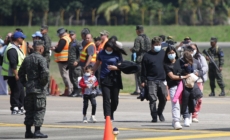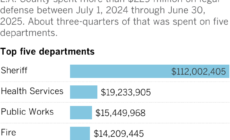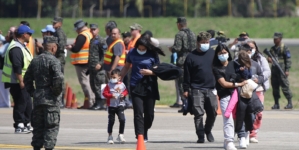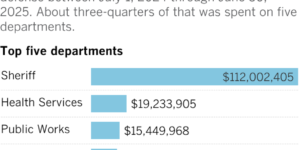-
More Americans Say Immigration Makes US ‘Better Off’ in 15% Swing: Poll - 44 mins ago
-
Catherine O’Hara, Star of ‘Best in Show,’ Honored in Westminster Dog Show Tribute - 48 mins ago
-
Inside the LAPD’s most notorious shadow unit - about 1 hour ago
-
Don Lemon Takes Stage at NYC Event After Arrest Over Minnesota Protest - 2 hours ago
-
L.A. stopped a couple from demolishing Marilyn Monroe’s home. Now, they’re suing - 2 hours ago
-
Backed by Mamdani, D.S.A. Candidate Wins Election for Mayor’s Old Seat - 2 hours ago
-
Palisades fire victims will see building permit fee relief during recovery - 3 hours ago
-
Trump, Changing Course, Throws Harvard Deal Talks Into Chaos - 3 hours ago
-
Tuberculosis outbreak reported at Catholic high school in Bay Area. Cases statewide are climbing - 3 hours ago
-
Mariners Lose 29-Year-Old Veteran Pitcher to Twins - 4 hours ago
L.A. street life ‘paralyzed’ as ICE raids keep shoppers away, close businesses
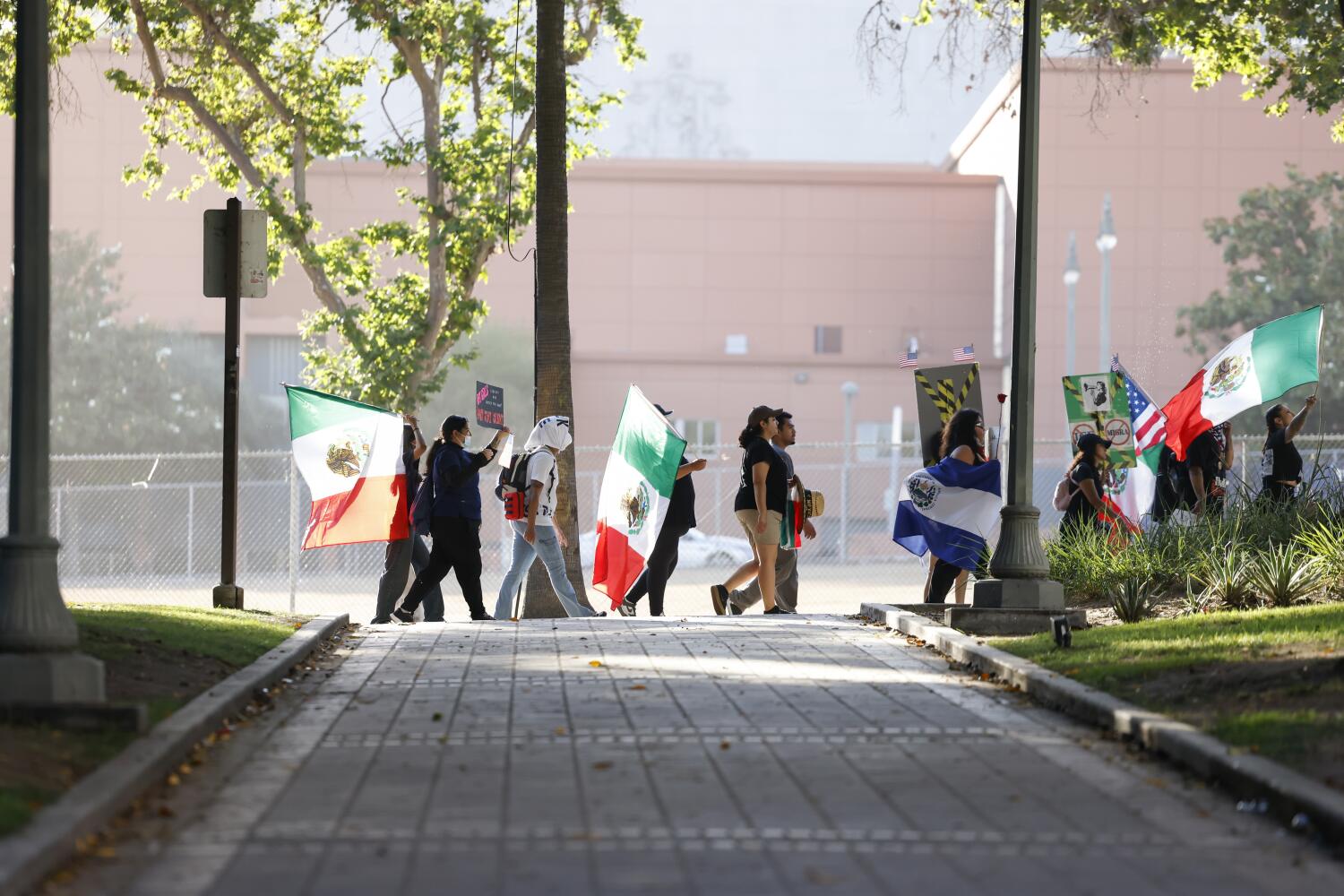
With federal immigration sweeps showing no signs of slowing across Southern California, there was growing concern from top officials, spiritual leaders and business owners that a climate of fear was sending more people underground and changing the rhythm of city life.
Once-bustling immigrant hubs, including MacArthur Park, the Garment District, downtown’s produce market and areas of the Eastside have seen a noticeable reduction in foot traffic over the last week, with some businesses forced to close as a result.
It comes as social media is rife with videos of immigration agents making arrests at shopping centers, swap meets, car washes and other businesses.
Los Angeles Archbishop José H. Gomez said he has been “disturbed” by how many of these raids have been carried out, and how they’ve caused a deep panic among his majority-Latino parishioners.
“People are staying home from mass and work, parks and stores are empty, the streets in many neighborhoods are silent,” Gomez in an opinion piece for Angelus, a local Catholic news outlet. “Families are staying behind locked doors, out of fear. … This situation is not worthy of a great nation.”
At the 7th Street Produce Market Wednesday morning, a spot usually bustling in the mornings with customers filling up plastic bags with vegetables and fruits — far fewer people than normal walked among the shops. Parking at the market was plentiful and several shops that are usually open were shuttered instead.
“Right now, with the immigration raids everything, no one is here,” said a security guard who asked not to be named.
In the nearby Garment District — where this recent surge in Immigration and Customs Enforcement operations began almost two weeks ago — the streets were empty except for a handful of customers peeking into stores. Workers there said there’s been no business since the immigration raids began.
“It affecting everything, it’s affecting all of us,” said Eva Ibrahim, 48, the owner of a shop that sells dresses and suits.
For a few days after the initial raids, workers and customers seemed afraid to come in, so several shops just stayed closed. This week, many of them opened back up, but workers said there just aren’t enough customers coming in.
“It’s like everything was paralyzed,” Ibrahim said. “… A lot of people don’t want come for fear they’ll get nabbed.”
The full economic toll of the raids is still difficult to calculate. But city and county officials are sounding alarms that it could be extensive — especially depending how long the stepped-up enforcement continues.
L.A. County Supervisor Hilda Solis on Tuesday got the county to agree to study how the recent immigration blitz had affected the economy, noting how many of the county’s immigrants are petrified to leave their home.
“They are terrorized,” Solis said. “You don’t see them.”
A few days ago, Mayor Karen Bass toured downtown’s historic Mariachi Plaza, which was deserted, and Boyle Heights and said she was stunned.
“It’s the uncertainty that continues that has an absolute economic impact. But it is pretty profound to walk up and down the streets and to see the empty streets, it reminded me of COVID,” Bass told The Times on Sunday afternoon.
On Tuesday, Los Angeles Archbishop José H. Gomez said he has been “disturbed” by how many of these raids have been carried out, and how they’ve caused a deep panic among his majority-Latino parishioners.
“People are staying home from mass and work, parks and stores are empty, the streets in many neighborhoods are silent,” Gomez said in an opinion piece for Angelus, a local Catholic news outlet. “Families are staying behind locked doors, out of fear. … This situation is not worthy of a great nation.”
In the Angelus essay, Gomez appeared to question involving the military and admonished the White House for putting the nation’s best ideals — which he described as being a “beacon of hope for those seeking freedom and refuge from oppression — under fire.
Earlier this week, an additional 2,000 National Guard members were activated and sent to L.A., joining a contingent of 3,000 National Guard and U.S. Marines already deployed to the area — against the wishes of state and local leaders.
Mounting stress — and confusion — about the immigration raids runs up and down the state. The administration has said multiple things at once, including that it will target all undocumented immigrants and that it won’t go after those working in agriculture and other vital industries. But then, in a social media post this week, President Trump said ICE deportation efforts in Los Angeles and other Democratic cities will grow.
As ICE’s presence in Southern California has grown, so has their opposition.
In Pico Rivera, after federal agents carried out a string of arrests Tuesday, protestors marched on city streets. City leaders distanced themselves from the raids, raising concerns about “warrantless stops” and “operations that appear to target specific communities.”
At a City Council meeting in Santa Ana, community members called for stronger policies to ensure the city’s status as a “sanctuary city” — the only such city in Orange County that limits cooperation with federal immigration officials, according to LAist. At one point, the city was exploring if its police could publicize alerts it receives from ICE, but the idea was ultimately tabled, citing legal issues, the Orange County Register reported.
U.S. Attorney Bill Essayli, a Trump appointee, warned Santa Ana officials in writing to abandon the idea, saying it would “not only hurt public safety, but it will also subject the city and its employees to potential criminal prosecution.”
While cities look for ways to address community concerns and stay within the letter of the law, regular citizens and community activists have been opposing ICE agents wherever they can find them.
In Pomona, activists rallied outside a hotel where they believed ICE agents were staying. Similar demonstrations have occured outside hotels near Los Angeles International Airport and Pasadena.
Meanwhile, an interfaith group was planning a prayer walk through downtown L.A. Wednesday evening in support of family unity.
“Walking as public witness, we will unite in prayer, nonviolence, and unwavering solidarity with our immigrant neighbors,” the group said.
Times staff writers Rebecca Ellis and Julia Wick contributed to this report.
Source link


